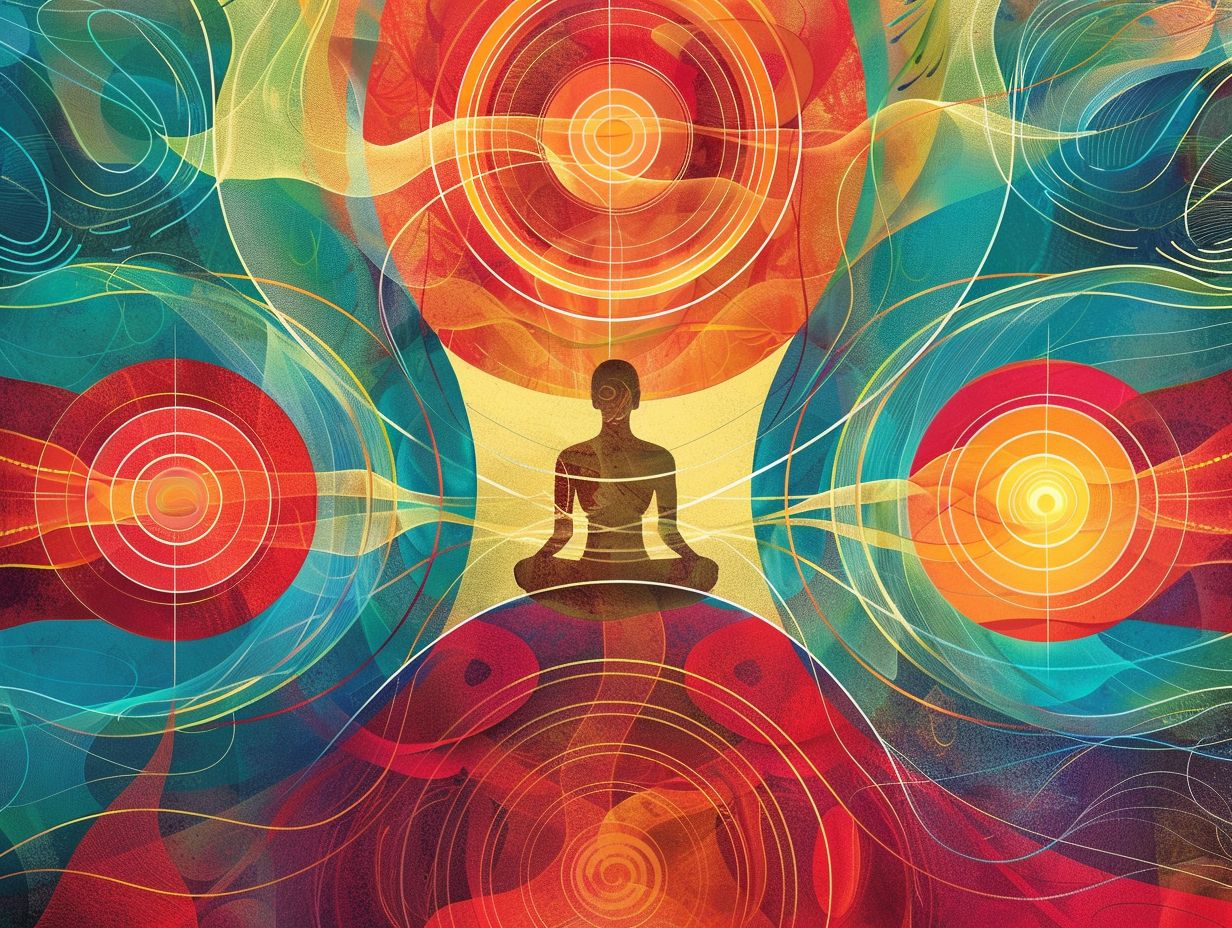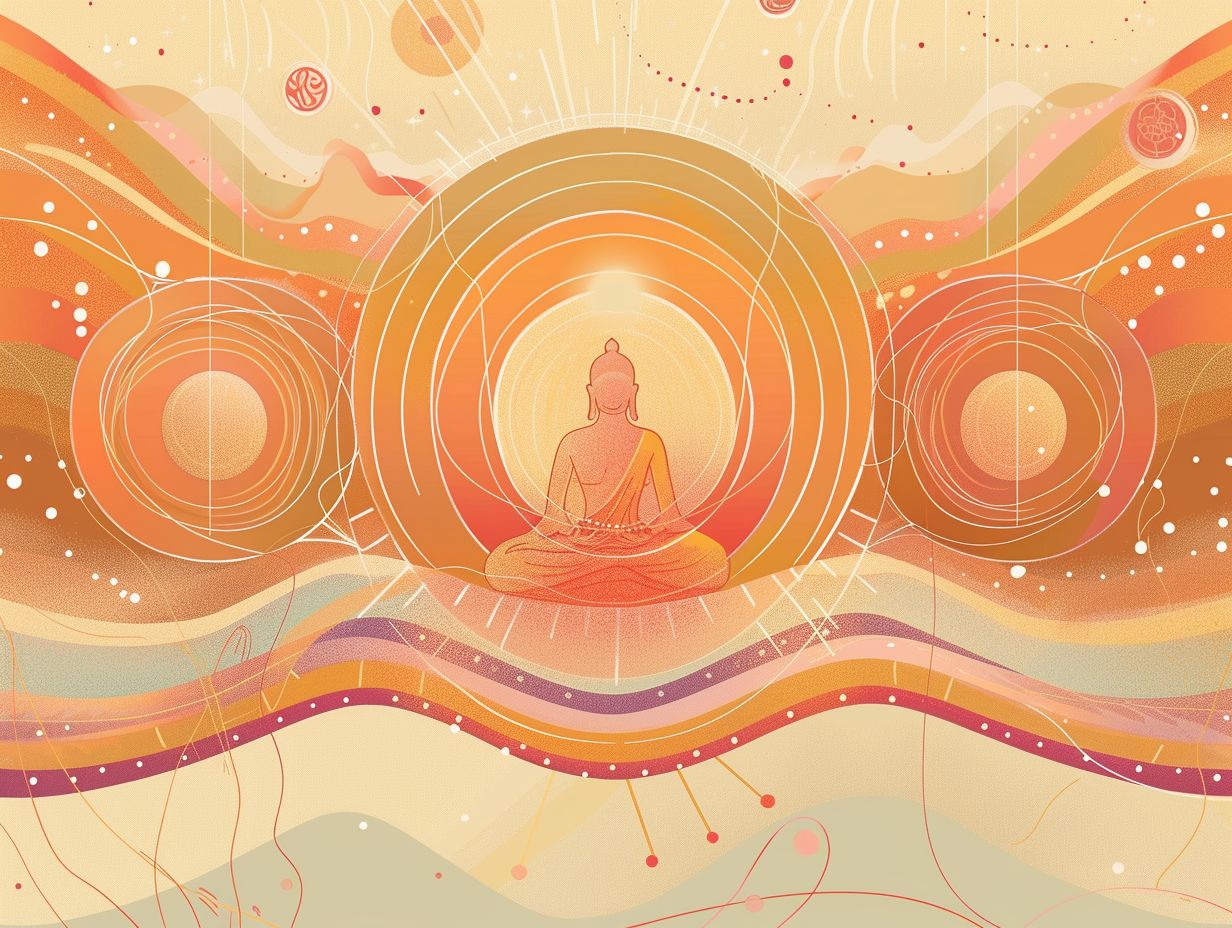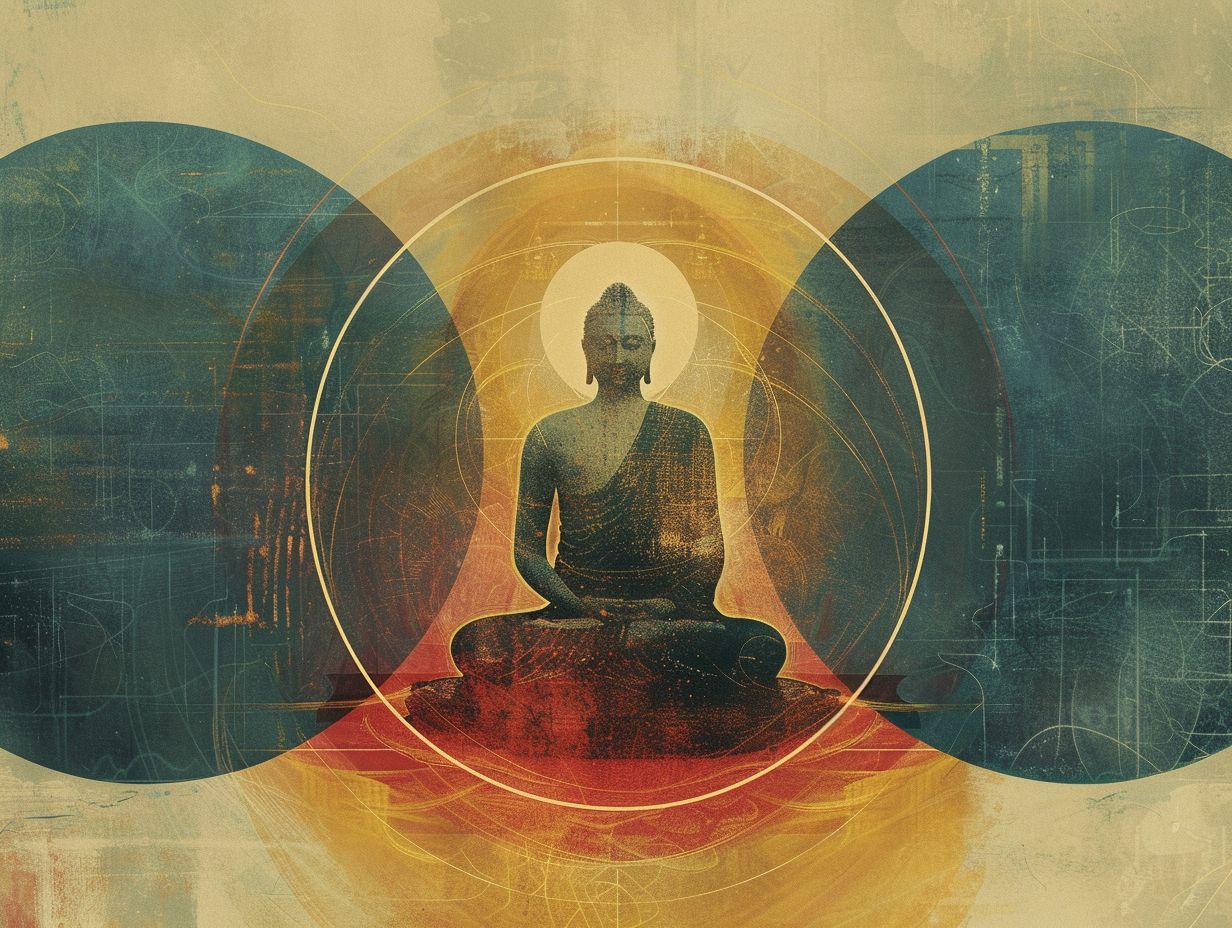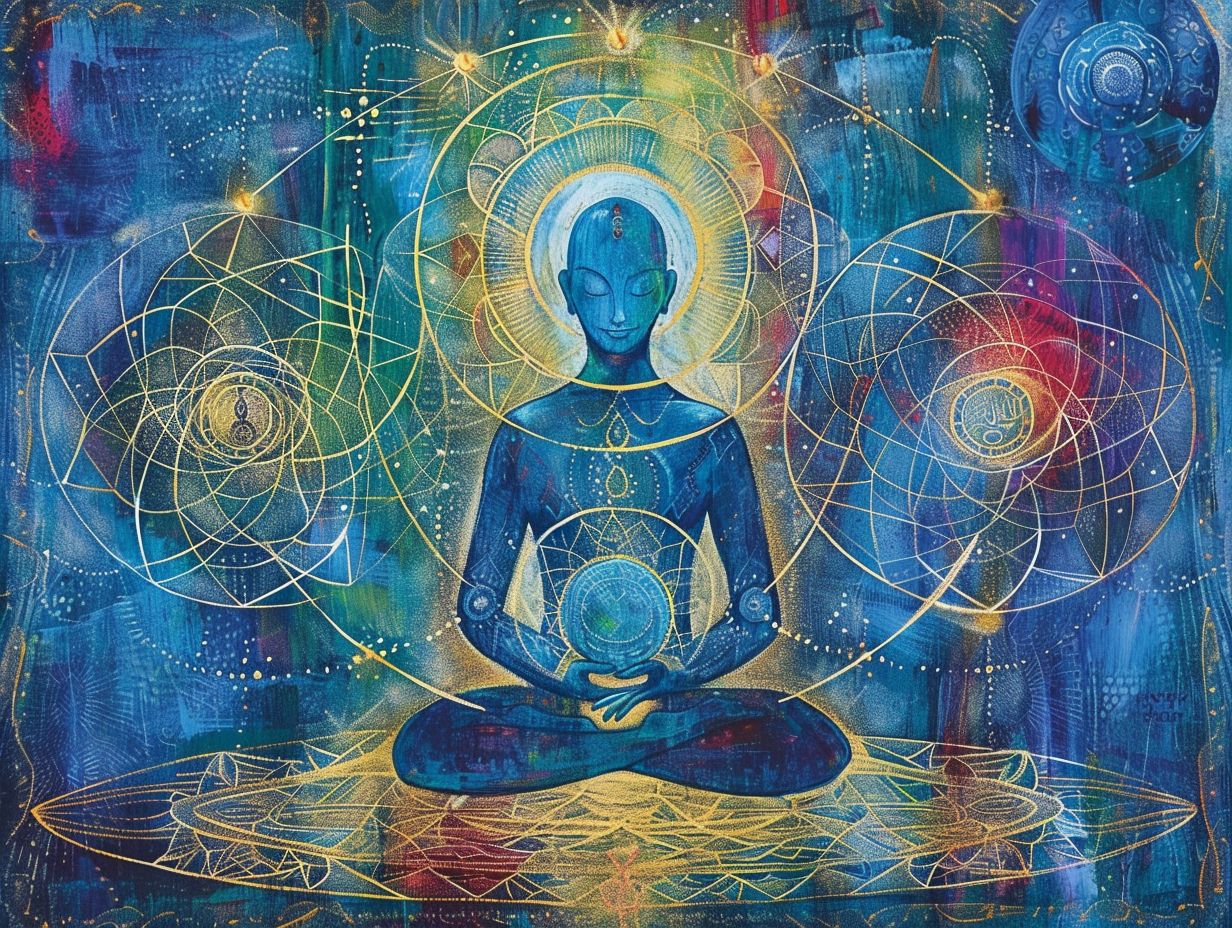The Concept of Karma: Present, Past, and Future Births
Karma is a captivating and intricate concept that transcends cultural boundaries, profoundly shaping our understanding of life s complexities. This exploration delves into the beliefs surrounding karma, examining its effects on present circumstances and its influence on both past and future existences.
Readers will discover the various types of karma, the methods for accumulating good karma, and the ways one might alter their karmic trajectory. By gaining a deeper understanding of karma’s role, individuals can uncover valuable insights for personal growth and navigate life’s challenges with enhanced clarity.
Engage in this journey to unravel the mysteries of karma and its significant impact on the human experience through the passage of time.
What Is Karma?

Karma represents a profound concept that embodies the moral law of cause and effect, intricately weaving together actions, intentions, and their spiritual consequences within the vast tapestry of existence.
It functions as a guiding principle in several religions, including Hinduism, Buddhism, and Jainism, where it is closely tied to the cycles of reincarnation and influences future births based on past lives and moral integrity.
By grasping the essence of karma, individuals can effectively navigate their soul’s journey toward spiritual growth, all the while adhering to dharma the ethical duties that promote enlightenment and liberation from the cycle of karma.
What Are The Different Beliefs About Karma?
Beliefs about karma manifest across various religious and philosophical landscapes, profoundly influencing how individuals perceive their moral responsibilities and the consequences of their actions in life. In Hinduism, karma is regarded as a direct consequence of one s actions, intricately linked to future reincarnation. In contrast, Buddhism highlights the importance of the mental state accompanying these actions, suggesting that understanding karma requires a deeper exploration of one’s intentions. Jainism calls for stringent ethical conduct to alleviate karmic debt, while Western philosophy may interpret karma through the lens of moral principles and ethical implications. This creates a rich tapestry of beliefs surrounding the concept of karma.
Such a dialogue fosters a multifaceted understanding that transcends mere actions, diving into the motivations and intentions that drive them. Individuals navigating these varied ideologies often grapple with the notion of moral integrity, a core tenet underpinning each tradition s teachings regarding the repercussions of one s deeds. In this context, karma evolves beyond a simple system of cause and effect; it becomes a profound reflection on the spiritual ramifications of human behavior.
Each belief system invites its adherents to cultivate a heightened awareness of their actions, positing that the journey toward enlightenment, resolution, or liberation is paved with ethically sound choices and an unwavering commitment to personal growth.
How Does Karma Affect Present Life?
Karma exerts a profound influence on an individual’s present life, intricately shaping experiences in accordance with past actions. This concept establishes a framework for understanding the intrinsic connection between one s deeds and the circumstances that unfold in life.
The cosmic law of cause and effect emphasizes the significance of ethical behavior, urging individuals to partake in good deeds that nurture spiritual growth and self-awareness.
Through the cultivation of mindfulness and personal responsibility, one can adeptly navigate the complexities of life while making a positive contribution to their karmic legacy, ultimately enriching their journey of spiritual evolution.
What Are The Different Types Of Karma?
Karma can be classified into several distinct types: past karma, present karma, and future karma, each of which plays a crucial role in shaping an individual’s soul journey and spiritual evolution.
Past karma consists of the accumulated actions from previous lives that significantly influence current circumstances. In contrast, present karma is focused on ongoing actions and their immediate effects. Future karma, conversely, encompasses the potential repercussions of current actions on future experiences, effectively creating karmic patterns that guide one s destiny and fate.
For example, an individual may find themselves confronting specific challenges in the present, challenges that arise from unresolved issues or deeds from past incarnations, thus underscoring the profound impact of past karma. Present karma manifests in daily choices, where acts of kindness or negativity directly influence relationships and opportunities, cultivating lessons essential for personal growth.
Meanwhile, future karma pertains to the seeds sown with each decision made today; these choices carve out a roadmap that can reshape future paths, prompting wiser actions.
Grasping these various facets of karmic relationships can illuminate the moral consequences of one s behavior and foster deeper spiritual awareness, ultimately guiding individuals toward a more enlightened existence.
How Can One Accumulate Good Karma?
Accumulating good karma entails engaging in positive actions and ethical behaviors that nurture spiritual growth and enhance collective karma. By practicing mindfulness and self-awareness, individuals can cultivate intentions grounded in love and compassion, which in turn foster karmic connections that deepen relationships.
Embracing the principles of karma yoga, which emphasizes selfless service, significantly amplifies one s capacity to generate good karma and create a meaningful impact on the cosmic balance.
It is crucial to recognize that the pursuit of good karma transcends mere deeds; it is fundamentally about the mindset that fuels those actions. When individuals approach their interactions with genuine kindness and consideration, they align themselves with ethical principles resonating on a universal scale. This alignment not only brings personal fulfillment but also opens pathways to karmic rewards, with the universe responding to the energy that is emitted.
Simple acts, such as volunteering time, offering assistance without expectation, or sharing a kind word, can create ripples that contribute to a broader tapestry of positive energy. Grasping the significance of both thought and action can transform everyday interactions into opportunities for cultivating good karma.
How Does Karma Affect Past Lives?

Karma holds a pivotal position in shaping the experiences and lessons derived from past lives, intricately interwoven within the karmic cycle that guides the soul’s journey through reincarnation.
Each person bears karmic debt, a consequence of prior actions and decisions, which in turn affects their present circumstances and spiritual trajectory.
Through a profound understanding of the lessons embedded in past lives, individuals can rise above negative karmic patterns, creating a pathway toward enhanced spiritual awakening and liberation in future existences.
What Is Reincarnation?
Reincarnation represents a profound process that encompasses the cycle of rebirth, wherein the soul transitions through multiple lives, each offering distinct opportunities for growth and learning within the framework of karma. This cycle is essential for grasping existential meaning, as it highlights the continuous evolution of the spirit on its quest for enlightenment and liberation.
Through each reincarnation, individuals encounter a variety of life experiences that contribute to their spiritual maturation and understanding of universal principles.
The concept resonates deeply within numerous spiritual traditions, including Hinduism, Buddhism, and certain indigenous beliefs, each interpreting this cycle in its own unique manner. Many believe that these successive lives enable the soul to fulfill specific contracts, thereby crafting a personalized spiritual journey that aligns with one s karmic debts and virtues.
Such soul contracts, integral to the reincarnation process, function as agreements that delineate the lessons the spirit must learn in each life. Ultimately, this interconnectedness of lives underscores the significance of actions taken in one incarnation, as they profoundly influence the trajectory of the soul in future existences.
How Does Karma Determine Reincarnation?
Karma serves as a pivotal force in the intricate process of reincarnation, with the accumulated actions and intentions from past lives intricately shaping the circumstances and experiences of future births.
Each choice made and consequence experienced reverberates through the cosmic tapestry, influencing not only the environment into which one is born but also the relationships that will be encountered along the way. This complex interplay of karmic energies cultivates conditions that foster learning and development, ensuring that moral consequences resonate across the continuum of time.
The lessons meant for mastery may manifest as either challenges or blessings, contingent upon the unresolved issues carried forward from previous existences. By recognizing these patterns, individuals can engage in profound reflection on their journeys, underscoring the notion of cosmic justice, wherein every action ultimately serves a purpose within the expansive narrative of spiritual evolution.
Can One Change Their Karma?
Individuals possess the remarkable ability to transform their karma through deliberate actions and profound spiritual practices designed to promote personal growth and karmic resolution. By embracing self-reflection, mindfulness, and ethical behavior, they can significantly alter their karmic patterns, alleviating the repercussions of past actions while crafting a more favorable future.
By give the power toing themselves to take responsibility for their choices, they can initiate a profound shift in the karmic cycle, ultimately guiding themselves toward enlightenment and liberation.
What Are The Different Ways To Change Karma?
Numerous avenues exist for transforming karma, including the pursuit of heartfelt good deeds, the practice of meditation, and the cultivation of self-awareness to align intentions with positive actions. Spiritual disciplines such as karma yoga, which emphasizes selfless service, can facilitate significant shifts in karmic energy, fostering healing and transformation.
By nurturing a mindset rooted in love and compassion, individuals can forge positive karmic connections that contribute to a more favorable karmic legacy.
To further amplify their efforts in altering karma, it is essential for individuals to consciously practice ethical behavior in their daily interactions. This involves acting with integrity and mindfulness, ensuring that one’s words and actions resonate with benevolent intentions.
Through consistent reflection on spiritual teachings and their application to everyday scenarios, individuals can cultivate a deeper awareness of the impact of their choices. Engaging in volunteer work, extending kindness to strangers, and dedicating time for quiet reflection can reinforce the intention behind these actions.
Ultimately, constructing a life anchored in compassion and ethical living not only cultivates good karma but also paves the way for profound personal transformation.
How Does Karma Affect Future Lives?

Karma profoundly influences future lives by shaping the circumstances and experiences individuals will face in their subsequent reincarnations, contingent upon their present actions and intentions. The tenets of karma assert that every action, whether virtuous or detrimental, plays a role in the creation of future karma, thereby impacting one s destiny and fate.
Grasping this intricate connection inspires individuals to act with moral integrity, cultivating a positive karmic legacy that paves the way for a more promising future.
What Are The Different Beliefs About Future Lives?
Beliefs regarding future lives exhibit remarkable diversity across cultures, with numerous spiritual traditions underscoring the impact of karma on subsequent births and the potential for spiritual evolution. In Hinduism, one s actions in the present life are thought to directly influence the conditions of future existences, whereas Buddhism emphasizes the crucial role that consciousness and intentions play in determining future rebirths. Such beliefs inspire individuals to contemplate their current behaviors, ultimately guiding them toward a path of ethical conduct and spiritual development.
The intricate connection between moral philosophy and these spiritual teachings reveals a shared human quest for understanding the repercussions of one’s actions. For instance, in Jainism, the concept of karma is deeply intertwined with the soul’s journey through multiple incarnations, accentuating non-violence and truthfulness as essential for spiritual progress. Similarly, ancient Egyptian beliefs posited that the purity of the heart dictated one s fate in the afterlife, illustrating that although the frameworks may differ, the foundational principle of accountability remains constant.
These diverse perspectives highlight how spiritual traditions offer profound insights into the significance of moral choices, cultivating a deeper awareness of how present actions can significantly shape one s existential narrative.
What Are The Benefits Of Understanding Karma?
An understanding of karma offers a multitude of benefits, serving as a catalyst for personal growth and spiritual awakening. It fosters an awareness of the moral consequences inherent in one’s actions and the valuable life lessons that accompany them.
By grasping the interconnectedness of actions and their repercussions, individuals can nurture ethical behavior, which in turn cultivates deeper relationships and a richer sense of fulfillment in life.
Furthermore, this comprehension give the power tos individuals to embrace responsibility for their actions, guiding them on a transformative journey toward enlightenment and liberation from the karmic cycle.
How Can Understanding Karma Help In Personal Growth?
Understanding karma plays a pivotal role in personal growth by enhancing self-awareness and offering invaluable life lessons that guide individuals on their spiritual journeys. By acknowledging the intricate relationship between actions and their consequences, individuals can engage in meaningful reflection on their behavior, resulting in positive transformations that align with their spiritual paths.
This heightened awareness fosters a proactive approach to life, encouraging ethical behavior and fostering deeper connections with others.
Exploring spiritual teachings further clarifies how karmic influence shapes one s journey. Through self-reflection, individuals become increasingly attuned to the impact of their choices, realizing that each action creates a ripple effect that extends into their surroundings.
This profound realization inspires a cultivation of compassion and empathy, nurturing healthier relationships grounded in mutual respect and understanding. By embracing the principles of karma, individuals embark on a continuous cycle of learning, where past experiences serve as stepping stones for future endeavors, ultimately leading to a more fulfilling and purposeful existence.
How Can Understanding Karma Help In Dealing With Life’s Challenges?
Understanding karma serves as a profound framework for navigating the complexities of life, providing a moral compass that guides individuals in making ethical decisions even in the face of adversity. This comprehension fosters resilience, allowing them to perceive obstacles as opportunities for spiritual growth and karmic resolution.
By recognizing the karmic patterns at play, individuals can approach challenges with a renewed sense of purpose, cultivating patience and compassion for both themselves and others.
This enriched perspective facilitates deeper self-reflection and spiritual accountability, give the power toing individuals to take responsibility for their actions and intentions. It encourages alignment with a greater cosmic order, emphasizing that every action creates a ripple effect throughout the universe.
As they navigate through trials, the understanding of karma inspires a steadfast commitment to ethical behavior, fostering a mindset that seeks harmony rather than conflict.
In essence, the transformative power of this awareness not only aids in coping with life s inevitable difficulties but also enhances personal growth and connection to the broader tapestry of existence.
Frequently Asked Questions

What is the concept of Karma?
The concept of Karma is a fundamental belief in Hinduism, Buddhism, and other Eastern religions. It is the belief that all actions, good or bad, have consequences that will affect a person in this life or future lives.
How does Karma relate to present births?
In the concept of Karma, present births are seen as a result of past actions. This means that the actions we take in this life will determine our future circumstances and experiences.
What is the role of past births in the concept of Karma?
Past births refer to the previous lives a person has lived. In the concept of Karma, it is believed that our actions in past lives have a direct influence on our current life and future births.
How does Karma affect future births?
Karma is believed to be a cycle that continues through different births. The actions we take in this life will determine the quality of our future births. Good actions lead to positive outcomes, while negative actions result in negative consequences in future lives.
Can a person change their Karma?
Yes, the concept of Karma also includes the belief that individuals have the power to change their actions and thus change their Karma. By practicing good actions and avoiding negative ones, a person can improve their Karma and bring positive outcomes in their present and future lives.
Is Karma only applicable to humans?
No, the concept of Karma extends to all living beings. It is believed that all actions have consequences, and this applies to all creatures, not just humans. Therefore, all beings are also subject to the cycle of Karma and the effects of their actions.
